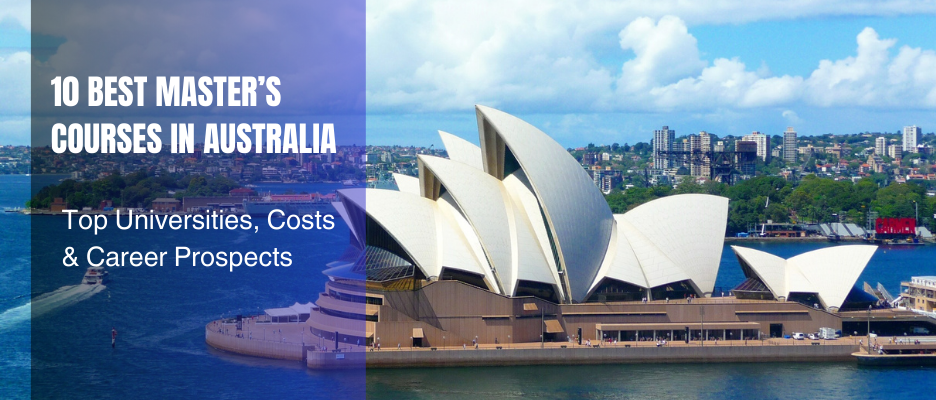
Australia has long been one of the most attractive destinations for higher education, particularly for international students looking to pursue postgraduate degrees.
“Education is the most powerful weapon which you can use to change the world.” — Nelson Mandela
When you study in Australia, that weapon becomes even more powerful—sharpened by world-class universities, a vibrant multicultural environment, and excellent career opportunities in fields where the government is addressing critical labour shortages.
As of 2025, nine Australian universities are ranked among the top 100 globally, underlining the nation’s strong academic standing. Beyond rankings, students are drawn to Australia for its multicultural environment, generous post-study work opportunities, and pathways to permanent residency.
In this blog, we explore the 10 best Master’s courses in Australia, their costs, leading universities offering them, and the career prospects they unlock. Whether you are interested in business, technology, healthcare, or engineering, there is a pathway for every aspiring professional.
Top 10 Master’s Courses in Australia
1. Master of Business Administration (MBA)
Why it’s popular
The MBA is one of the most recognised postgraduate qualifications worldwide, and Australia offers some of the best programs in the Asia-Pacific region. Australian MBAs focus on leadership, strategy, entrepreneurship, and innovation, building analytical skills and strong industry networks.
Top universities
Leading schools include Melbourne Business School, AGSM at UNSW, Monash Business School, UQ Business School, and Macquarie Business School. These programs often feature global exchange options and connections with multinational corporations, giving graduates a competitive edge.
Costs
MBA programs in Australia are on the higher end of the tuition scale, typically ranging between AUD 30,000 and AUD 80,000 for the full degree.
Career prospects
Graduates often move into senior roles such as consultants, managers, strategists, and entrepreneurs. Average salaries for MBA graduates in Australia can exceed AUD 100,000 annually, especially in consulting and financial services.
2. Master of Professional Accounting
Why it’s in demand
With growing global business activity and financial regulations, there is a consistent demand for accounting professionals. A Master of Professional Accounting is a pathway to becoming a Chartered Accountant (CA) or Certified Practising Accountant (CPA) in Australia, credentials that carry international recognition.
Top universities
Well-regarded programs are offered by Monash University, University of Melbourne, UNSW Sydney, and the University of Queensland.
Costs
Fees generally range between AUD 25,000 and AUD 50,000 per year.
Career prospects
Graduates can pursue careers as accountants, auditors, tax advisors, and financial controllers. With experience, they often move into senior finance leadership roles such as Chief Financial Officer.
3. Master of Computer Science / Information Technology / Data Science
Why it’s trending
The digital revolution has transformed every industry, creating unprecedented demand for IT specialists, data scientists, and software engineers. Australia has also set a goal to add over a million new tech workers by 2030, making this field highly secure for international graduates.
Top universities
All Group of Eight universities—Melbourne, Sydney, UNSW, Monash, ANU, UQ, Adelaide, and UWA—offer strong programs in IT and Data Science. Many universities partner with industry leaders like Microsoft, Google, and Amazon, ensuring graduates gain practical exposure.
Costs
Programs typically cost between AUD 25,000 and AUD 50,000 annually.
Career prospects
Graduates are highly sought after as software developers, AI specialists, data analysts, and cybersecurity experts. Salaries are strong, often starting at AUD 80,000 and rising significantly with experience.
4. Master of Social Work
Why it matters
For students driven by purpose and social impact, Social Work is an ideal choice. Australia has a growing demand for qualified social workers to support communities, healthcare systems, and welfare organisations.
Top universities
The University of Sydney, University of Melbourne, UNSW Sydney, and Queensland University of Technology are popular choices.
Costs
Tuition fees range between AUD 25,000 and AUD 45,000 per year.
Career prospects
Graduates can work in NGOs, government agencies, schools, and healthcare institutions. Career pathways include community development officer, mental health practitioner, and child protection worker.
5. Master of Engineering
Why it’s vital
Engineering continues to be a cornerstone of infrastructure, technology, and industrial growth. With major investments in renewable energy, transport, and construction, Australia has a sustained need for engineers across disciplines.
Top universities
Go8 universities, including University of Melbourne, Monash, UNSW, and ANU, offer world-class engineering programs across civil, mechanical, electrical, and software specialisations.
Costs
Tuition generally falls between AUD 30,000 and AUD 55,000 annually.
Career prospects
Graduates work as civil engineers, project managers, mechanical engineers, and electrical engineers. With Australia’s ongoing infrastructure projects, employment opportunities are plentiful. Salaries typically start at AUD 70,000 and rise with seniority.
6. Master of Finance / Applied Finance
Why choose this
For students passionate about numbers, investments, and financial markets, Finance is a natural choice. With Australia’s sophisticated financial services sector, graduates have excellent prospects both locally and internationally.
Top universities
Macquarie Business School’s Master of Applied Finance is globally recognised, along with strong offerings at Melbourne, UNSW, and Monash.
Costs
Annual tuition ranges between AUD 30,000 and AUD 60,000.
Career prospects
Careers include roles as investment bankers, portfolio managers, risk analysts, and corporate finance consultants. Starting salaries are attractive, with professionals often earning above AUD 80,000 in the early stages of their career.
7. Master of Nursing / Healthcare
Why it’s growing
Australia faces a shortage of skilled healthcare workers, and postgraduate nursing degrees provide pathways for advanced practice, leadership, and specialised roles. This makes it a highly employable degree, especially for international students seeking post-study work opportunities.
Top universities
Universities like Queensland, Griffith, Sydney, and Monash are well-known for their healthcare and nursing programs.
Costs
Programs cost between AUD 25,000 and AUD 50,000 per year.
Career prospects
Graduates can become clinical nurse specialists, nurse educators, or healthcare administrators. Nursing professionals in Australia are in high demand, with salaries often starting at AUD 70,000 and rising quickly with experience.
8. Master of Teaching / Education
Why it matters
There is a significant teacher shortage in Australia, creating consistent demand for graduates in this field. Master of Teaching programs prepare students for careers in primary, secondary, or specialized education.
Top universities
Strong programs are available at the University of Sydney, UNSW, and the University of Queensland.
Costs
Fees are generally AUD 25,000 to AUD 40,000 annually.
Career prospects
Graduates can work as teachers, curriculum designers, or education administrators. Career stability is strong, and teaching can also lead to leadership positions such as principal or policy advisor.
9. Master of Architecture / Built Environment
Why it stands out
Architecture and urban planning are increasingly important as cities face challenges of sustainability, climate resilience, and rapid growth. This degree combines creativity with technical expertise.
Top universities
University of Melbourne, UNSW, RMIT, and Queensland University of Technology are popular choices.
Costs
Programs range from AUD 30,000 to AUD 55,000 per year.
Career prospects
Graduates can become architects, project managers, or urban planners. With global demand for sustainable design, career prospects are strong.
10. Master of Medicine / Medical Sciences
Why it’s valued
Healthcare and medical research are global priorities, and Australia offers advanced training in medicine, clinical sciences, and research fields. Entry is competitive but the rewards are significant.
Top universities
The University of Melbourne, Monash University, and University of Sydney are among the top providers.
Costs
Medical programs are among the most expensive, with tuition fees between AUD 40,000 and AUD 65,000 per year or higher.
Career prospects
Clinical practice, research, specialised medical roles; among the highest salaries across professions.
Top Universities in Australia for Master’s Programs
Australia’s Group of Eight (Go8) universities are the most prestigious and research-focused institutions. They consistently rank among the world’s best and have strong connections with industry, government, and global partners.
- University of Melbourne – Ranked among the world’s top 20, with excellence across business, law, engineering, and medical sciences.
- UNSW Sydney – Known for business, engineering, and social sciences, with high graduate employability.
- Australian National University (ANU) – Located in Canberra, specialising in policy, research, and international studies.
- Monash University – Strong in medicine, engineering, and business.
- University of Sydney – Broad range of postgraduate programs and renowned research excellence.
University of Queensland, University of Adelaide, and University of Western Australia also feature prominently, offering globally respected master’s degrees.
Costs of Studying a Master’s in Australia
- Tuition fees: Most programs fall between AUD 25,000 and AUD 50,000 annually, though specialised fields such as MBA or Medicine may cost significantly more.
- Living expenses: Budget AUD 20,000–27,000 per year for accommodation, food, transport, and personal costs.
- Scholarships & work: Many universities offer scholarships for international students. Student visas allow up to 48 hours of work per fortnight during study periods and full-time work during breaks.
Career Prospects After a Master’s in Australia
A master’s degree from an Australian university can open doors to both domestic and international careers.
- Salary range: Graduates typically earn between AUD 70,000 and AUD 100,000 per year, depending on the field. IT, finance, engineering, and healthcare command the highest starting salaries.
- Post-study work visa: International graduates can stay back and work for two to four years, depending on their qualification and location of study.
- PR pathways: Many graduates use their qualifications and skilled employment to apply for permanent residency, especially in occupations on Australia’s skilled migration list.
Conclusion: Take the Next Step Towards Your Master’s in Australia
Choosing the right Master’s degree is one of the most important decisions for your career and future. Australia offers a perfect blend of academic excellence, practical exposure, and post-study career opportunities. Whether you’re aiming for a leadership role with an MBA, a high-demand tech job through Computer Science or Data Science, or a rewarding career in healthcare, engineering, or education, there’s a program that aligns with your goals.
With world-class universities, generous work rights, and pathways to permanent residency, studying in Australia is more than just an education—it’s a life-changing investment.
👉 Ready to start your journey? Our expert counsellors at MDOEC can help you shortlist universities, check your eligibility, guide you through scholarships, and ensure a smooth application process.
Don’t wait—secure your place for the upcoming intake and take the first step towards building your dream career in Australia!
FAQs: Master’s in Australia
Q1. What are the basic eligibility requirements for international students?
To be eligible, students generally need a recognised bachelor’s degree with a strong academic record. Proof of English proficiency—through IELTS, TOEFL, or PTE—is mandatory. Some specialised courses, such as MBA, Nursing, or Medicine, may also require professional work experience or prerequisite subjects.
Q2. Are scholarships available for international students?
Yes. International students have access to several scholarships funded by the Australian Government, universities, and private organisations. Popular options include Australia Awards Scholarships, Destination Australia Scholarships, and merit-based awards from universities. These can reduce tuition fees significantly and, in some cases, also help with living expenses.
Q3. Can international students work part-time while studying?
Absolutely. On a valid student visa, international students can work up to 48 hours per fortnight during academic terms and full-time during scheduled breaks. Part-time work not only helps cover living costs but also provides valuable Australian work experience.
Q4. How does studying a Master’s support PR opportunities?
Many master’s programs in Australia align with occupations listed on the Skilled Occupation List (SOL). Graduates in high-demand fields—such as Nursing, IT, Engineering, and Accounting—are often well-positioned to apply for post-study work visas, which can lead to permanent residency pathways.
Q5. What is the typical duration of master’s courses?
Most master’s programs run for 1.5 to 2 years, depending on whether the program is research-based, coursework-based, or a combination of both. Accelerated options may allow students with prior qualifications or experience to finish earlier.
Q6. Is health insurance mandatory for international students?
Yes. All international students must purchase Overseas Student Health Cover (OSHC) for the entire duration of their visa. This provides access to essential healthcare, including doctor visits, hospital care, and prescription medicines, ensuring peace of mind during their stay.
Q7. How much does it cost to study a Master’s in Australia?
Tuition fees for master’s programs usually range between AUD 25,000 and AUD 50,000 per year, depending on the course and university. Professional degrees like MBA or Medicine can be more expensive. Students should also budget an additional AUD 20,000–27,000 annually for living expenses such as housing, food, transport, and personal costs.
Q8. What are the post-study work opportunities?
Graduates are eligible for a Temporary Graduate Visa (subclass 485), which allows them to stay and work in Australia for 2 to 4 years, depending on the qualification and location of study. This provides valuable work experience and, for many, a pathway to permanent residency.
Q9. Which intake is best?
The two major intakes are February (Semester 1) and July (Semester 2). February is the primary intake with the widest range of courses available, while July offers a second chance for students who may have missed the earlier intake. Some universities also offer a smaller November intake for selected programs.
Q10. How do Australian universities rank globally?
Australia is home to several world-class universities. The Group of Eight (Go8)—including the University of Melbourne, ANU, Monash, UNSW, and University of Sydney—regularly feature among the top 100 globally. These institutions are known for strong research output, industry connections, and high graduate employability.
Q11. Can students bring dependents?
Yes. Students can include their spouse or children on their visa application. Dependents are allowed to live in Australia, and spouses may also be permitted to work, depending on the student’s course of study.
Q12. What support services are available?
Australian universities provide extensive support, including orientation programs, academic assistance, career counselling, and mental health services. International student support centres also help with accommodation, legal advice, and integration into campus life, ensuring students feel welcome and supported.
About the Director
Rikhil Nair is the Director of MDOEC, a leading overseas education consultancy helping students achieve their global study dreams with personalised guidance and end-to-end support. Passionate about empowering young talent, Rikhil combines industry expertise with a hands-on approach to simplify the study abroad journey. Outside of work, he enjoys travelling to new countries, exploring different cuisines, and playing cricket. Connect with him on LinkedIn.





